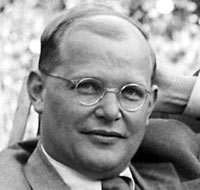Dietrich Bonhoeffer is portrayed as a great example of the Christian faith, e.g. in Christian Focus’ “Ten Boys Who Didn’t Give in”. (Christian Focus’ children’s books are a blessing from God, but one of the main criticisms I would have is their uncritical presentation of some Christians and professed Christians.) Although, he is a great example of courage and conviction (so is Gandhi), it is questionable whether he was a Christian based on the following account of his life and beliefs:
Dietrich Bonhoeffer (1906-1945) was a neo-orthodox German theologian, pastor, preacher, radio broadcaster, and prolific writer in the 1930s and early-1940s, during the rise, rule, and downfall of Adolph Hitler. He was greatly fascinated with neo-orthodox thought, theology, and terminology, and was greatly influenced by the major theologian of neo-orthodoxy, Karl Barth (1886-1968). Bonhoeffer’s writings are credited with helping to father the “Death of God” theology which was popularized by the Anglican Bishop John A.T. Robinson in the decade of the 1960s.
Bonhoeffer was in reality a practical atheist and a religious humanist who denied virtually every cardinal doctrine of the historic Christian faith (Letters and Papers from Prison, ed. Eberhard Bethge, New York: Macmillan Co., 1972, pp. 9-12). Bonhoeffer readily acknowledged “the debt he owes to liberal theology.” Declaring that it was impossible to know the objective truth about Christ’s real nature and essence, Bonhoeffer proclaimed that God was dead.
Moreover, Bonhoeffer believed that the true Christian was the confessing believer who totally immersed his life in the secular world, becoming a secular Christian. Rejecting the objective unalterable moral standards of the Bible, Bonhoeffer proclaimed a situational ethics — that right and wrong are determined solely by the “loving obligations of the moment” (Letters and Papers from Prison, ed. Eberhard Bethge, New York: Macmillan Co., 1972, pp. 9-12, 378; Ethics, pp. 38, 186; No Rusty Swords, pp. 44-45).
The son of a Berlin professor of psychiatry, Bonhoeffer studied theology at Tubingen, Berlin and at Union Theological Seminary in New York City. When Hitler came to power in 1933, Bonhoeffer, student chaplain and lecturer at the University of Berlin, joined the anti-Nazi pastors in the German “church struggle.” In 1935, he was appointed head of the Finkenwalde Confessing Church Seminary, which was closed by the government in 1937. In 1939, Bonhoeffer rejected the possibility of a job in America, safe from the impending European war. He was convinced that he had to face the difficulties ahead with the Christians in Germany. Back in Germany during World War II, Bonhoeffer was forbidden to preach or to publish.
Though claiming to be a disciple of Gandhi and his credo of non-violence, Bonhoeffer worked as a double agent in the anti-Nazi resistance movement and in the German military office, and eventually joined the wartime conspiracy to assassinate Hitler. His arrest in 1943, however, arose from his direct involvement in smuggling fourteen Jews to Switzerland. He was hanged by the Nazis at Flossenburg on April 9, 1945.
Although only 39 when executed, Bonhoeffer left a rich legacy of books, some of his best known being Sanctorum Communio, Act and Being, The Cost of Discipleship, and Life Together, as well as letters, papers, and notes published by his close friend and biographer, Eberhard Bethge. These include Letters and Papers from Prison, Ethics, and six volumes of collected writings (Dr. Ruth Zerner, City University of New York, “Dietrich Bonhoeffer,” Eerdmans’ Handbook To The History of Christianity, 1977, p. 603).
Although Bonhoeffer presented his own strain of neo-orthodox existentialism, many evangelicals have been taken in by his warm-hearted piety and by his high sounding devotion to Christ and call to suffer for His sake. His religious terminology may appear to be evangelical, but its substance was existential. Yet, there are those today who continue to present Dietrich Bonhoeffer as a genuine Christian hero (e.g., Don Matzat, Chuck Colson, and the editorial board of Christianity Today). Grand Rapids Baptist College (GARBC — now Cornerstone College) scheduled a play in the fall of 1991 which extolled Bonhoeffer’s memory. And Dr. John F. MacArthur, Jr., has used quotes from Bonhoeffer to expound on the nature of true Christian fellowship (“The Riches and Responsibilities of Fellowship,” The Master’s Current, Winter 1994, p. 2). All such accolades to Bonhoeffer are clearly unwarranted.
The following is a summary of beliefs and influence of Dietrich Bonhoeffer as taken from some of the over 14 books and documents attributed to him:
1. He believed that “God is teaching us that we must live as men who can get along very well without Him. The God who is with us is the God who forsakes us.” Bonhoeffer also believed that the concept of God as a “supreme Being, absolute in power and goodness,” was a “spurious conception of transcendence,” and that “God as a working hypothesis in morals, politics, and science … should be dropped, or as far as possible eliminated” (Letters and Papers from Prison, S.C.M. Press edition, Great Britain: Fontana Books, 1953, pp. 122, 164, 360).
2. He believed that mankind had become of age and no longer needed religion, which was only a deceptive garment of true faith; he suggested the need for a “religionless Christianity.” To Bonhoeffer, “the Christian is identified not by his beliefs, but by actions, by his participation in the suffering of God in the life of the world” (Letters and Papers from Prison, S.C.M. Press edition, Great Britain: Fontana Books, 1953, p. 163). Thus, Bonhoeffer’s final writings have given impulse to Marxist theologians sponsoring “liberation theology” and to others wishing to promote a worldly social gospel.
3. He refused to discuss the origin of Christ, His relationship to the Father, His two natures, or even the relationship of the two natures. Bonhoeffer was adamant in his belief that it was impossible to know the objective truth about the real essence of Christ’s being-nature (Christ the Center, pp. 30, 88, 100-101).
4. He questioned the Virgin Birth, and in reality denied it (The Cost of Discipleship, p. 215).
5. He denied the deity of Christ; he advocated that “Jesus Christ Today” is not a real person and being, but a “corporate presence” (Testimony to Freedom, pp. 75-76; Christ the Center, p. 58).
6. He denied the sinlessness of Christ’s human nature and further questioned the sinlessness of His earthly behavior (Christ the Center, pp. 108-109).
7. He believed that Christ exists in three “revelatory forms” — as Word, as sacrament, and as church. From asserting that Christ is the church, he followed that all persons in the church are identical with Christ (Christ the Center, p. 58; The Cost of Discipleship, p. 217). This amounts to pantheism!
8. He believed that Christianity is not exclusive, i.e., that Christ is not the only way to God (Testimony to Freedom, pp. 55-56).
9. He was a prominent figure in the early ecumenical movement, as evidenced through his associations with the “World Alliance for International Friendship” (a forerunner of the apostate World Council of Churches [WCC]), Union Theological Seminary, and Visser ‘t Hooft (who later became the first General Secretary of the WCC) (Testimony to Freedom, pp. 22, 212, 568). Bonhoeffer also reached out to Roman Catholics, prefiguring the broader ecumenism that blossomed after Vatican II in the mid-1960s.
10. He was a practical evolutionist (No Rusty Swords, p. 143), and believed that the book of Genesis was scientifically naive and full of myths (Creation and Fall: A Theological Interpretation of Genesis 1-3).
11. He adhered to neo-orthodox theology and terminology concerning salvation (Testimony to Freedom, p. 130), was a sacramentalist (Life Together, p. 122; The Way to Freedom, pp. 115, 153), believed in regenerational infant baptism (Letters and Papers from Prison, Macmillan, pp. 142-143) as well as adult baptismal regeneration (The Way to Freedom, p. 151), equated church membership with salvation (The Way to Freedom, p. 93), and denied a personal/individualistic salvation (Letters and Papers from Prison, Macmillan, p. 156).
12. He placed little or no value on the Old Testament –“… the faith of the Old Testament is not a religion of salvation” (Letters and Papers from Prison, S.C.M. Press edition, Great Britain: Fontana Books, 1953, p. 112).
13. He denied the verbal-plenary inspiration of Scripture, believing that the Bible was only a “witness” to the Word of God and becomes the Word of God only when it “speaks” to an individual; otherwise, it was simply the word of man/men (Testimony to Freedom, pp. 9, 104; Sanctorum Communio, p. 161). To Bonhoeffer, the Bible was meant “to be expounded as a witness, not as a book of wisdom, a teaching book, a book of eternal truth” (No Rusty Swords, p. 118). He also believed in the value of higher criticism/historical criticism, which is a denial of the inerrancy and authenticity of the Bible (Christ the Center, pp. 73-74).
14. He had no faith in the physical resurrection of Christ. Bonhoeffer believed the “historicity” of the Resurrection was in “the realm of ambiguity,” and that it was one of the “mythological” elements of Christianity that “must be interpreted in such a way as not to make religion a pre-condition of faith.” He also believed that “Belief in the Resurrection is not the solution of the problem of death,” and that such things as miracles and the ascension of Christ were “mythological conceptions” as well (Christ the Center, p. 112; Letters and Papers from Prison, S.C.M. Press edition, Great Britain: Fontana Books, 1953, pp. 93-94, 110).
Dr. G. Archer Weniger declared, “If there is wholesome food in a garbage can, then one can find some good things in Bonhoeffer, but if it be dangerous to expect to find nourishment in a garbage can, then Bonhoeffer must be totally rejected and repudiated as blasphemy. It is worse than garbage” (FBF Information Bulletin, May 1977, p. 12).
* The material in this report was adapted in part from a paper by Don Jasmin (Fundamentalist Digest, P.O. Box 2322, Elkton, MD 21922-2322). See also the 9/13/93 and 9/18/95 issues of Christian News (p. 21 and pp. 11-13, respectively), and the Oct-Dec 1991 Bibliotheca Sacra, pp. 399-408.]



